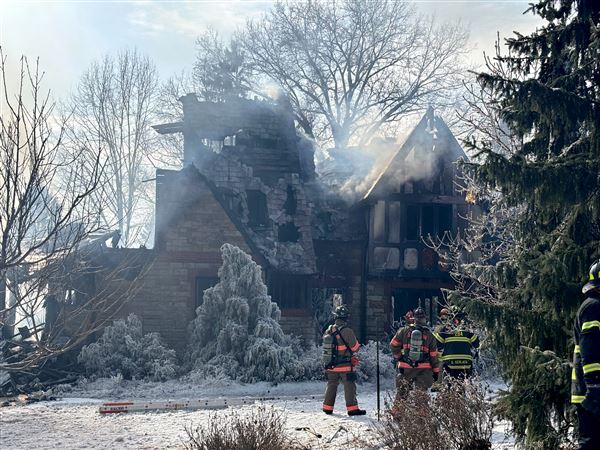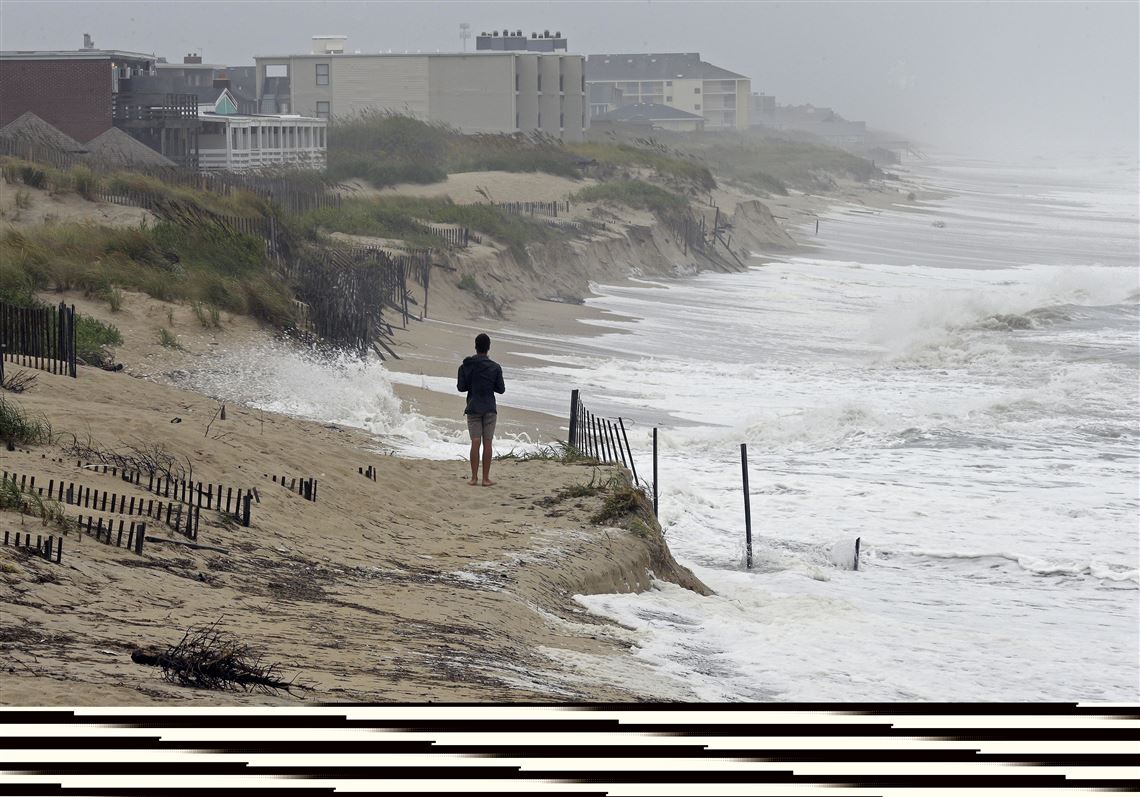Millions of people in the path of Hurricane Florence are frantically preparing for a monster storm that’s anticipated to make landfall as early as Friday afternoon. Residents in states from Virginia to Georgia — especially those who live in flood-prone areas or on the coast — must decide whether to stay or go.
Here are some snapshots of a region awaiting the hurricane:
STOCKING UP AND WAITING IT OUT
Barbara Timberlake of Leland, North Carolina, walked down with her dog to look at the choppy Cape Fear River. She lives about 15 miles inland from Wrightsville Beach, in the path of the storm.
She said she was born in Wilmington and that her family always had a tradition of going to the beach to watch the ocean before a major storm hit. But the beaches are closed due to mandatory evacuations.
“It’s a family tradition to go look at the ocean. Now they won’t let you over the bridge, so the next best thing is an angry river,” she said.
She said she and her husband felt safe to ride out Hurricane Florence in their house, even though most of their neighbors have left town. She thinks they left because most are originally from the North and not used to riding out hurricanes.
“We’re in a fairly new house in a gated community,” she said. “Most everyone is gone.”
She said she and her husband stocked up on supplies.
“We bought rum and beer. I boiled some peanuts. Lots of bottled water,” she said. “I have a gas stove so even if electricity goes off I can use it.”
WORRIED BUT STAYING PUT
Julie Terrell of Wilmington decided it was safe enough to ride out the storm in her neighborhood several miles inland despite her concerns about falling trees.
On Thursday, she walked past a row of shops fortified with boards, sandbags, and hurricane shutters to look at the choppy Cape Fear River that could overflow and inundate downtown shops. She ducked into a Waffle House restaurant, one of the few still open.
Winds were causing traffic lights to sway and Spanish moss in trees to blow sideways.
She said she worries about damage in her neighborhood from old trees.
“On a scale of 1 to 10, I’m probably a 7” in terms of worry, she said.
“Because it’s Mother Nature. You can’t predict.”
“We have a bunch of old trees in our neighborhood. Everything is old, so that’s concerning,” she said.
HUNKERING DOWN WITH THE CATS
One South Carolina family living two blocks from the ocean thought long and hard about leaving before Hurricane Florence hit, but they just couldn’t afford it.
Mercedes O’Neill said she is scared to be in her North Myrtle Beach home with her boyfriend, her 6-year-old daughter and a son due Sept. 27 when the winds and rain pick up. But she says they couldn’t afford to stay in a hotel or to drive to a shelter. And she didn’t want to leave her cats behind.
A family member rented a room, but when the storm slowed down, they couldn’t afford any extra days.
O’Neill’s boyfriend Kelly Johnson says the couple needs to get back to work as soon as they can and returning after an evacuation can take several days.
A FINAL GLASS OF WINE
Hours before a mandatory evacuation took effect, Wrightsville Beach, North Carolina, resident Phoebe Tesh paused while loading her car to have a glass of wine on the steps of the house where she and her husband rent an apartment.
“We just love it down here so much we want to spend as time as we can,” she said.
Tesh, who works in information technology for UNC-Wilmington, said she and her husband have been ferrying valuables to her parents’ house on the mainland in Wilmington, where they planned to ride out the storm.
“We started out with anything that cost over $200. Now we’re down to anything over $30,” she said, waving toward an SUV crammed with plastic bins and various items, including a block of chef’s knives. “Next time, we need a box truck.”
She and her husband, a professor at UNC-W, love the beach so much they sold a house on the mainland to rent there full time five years ago. She said they typically evacuate for major storms, and even neighbors who tend to ride out hurricanes are leaving.
“We don’t know of anyone who’s staying for the storm,” she said.
COMING OUT OF RETIREMENT TO HELP
Looking over a fleet of utility trucks staged near Charlotte Motor Speedway, retired utility worker Paul Anderson confessed Wednesday that he gets a rush from helping out with recovery efforts. The pay is good, but that’s not why he does it.
“It’s adrenaline,” said Anderson, 59, of Lake City, Florida. “As soon as I get the call to go to work, I’m a changed man. My wife will tell you that. It makes you feel good to go help people. Plus, you get paid.”
Anderson didn’t hesitate this time, gathering people from Florida and Alabama and preparing to roll toward Wilmington, North Carolina. At least two dozen trucks were parked near the speedway as workers loaded equipment into a trailer.
“When (my boss) asked me if I’d go down to the coast, I said yeah. And he said ‘You know what you’re getting into, don’t you?‘ and I said, ‘That’s where I want to be. I want to be right in the middle of it.‘”
Finally, Anderson admitted to one fear.
“I’m scared of the water,” he said. “I’m not scared of the wind. (Hurricane) Irma had a lot of wind. You don’t want to be out in it but you can protect yourself from that. This water thing, we’ve never had to face that. “
LEARNING FROM PAST EXPERIENCE
Seth Bazemore lives in one of the most flood-prone neighborhoods in Norfolk, Virginia: A sliver of land known as Willoughby Spit that juts into Chesapeake Bay like a hitch-hiker’s thumb.
Previous hurricanes have made him a survivor.
On Wednesday, his brick house was lined with sandbags. Six bilge pumps sat inside on the ground floor, ready to push out the heavy rains and possible flood surge that the outer bands of Hurricane Florence are forecast to deliver.
“It looks like a ship moored to a pier,” said the 62-year-old engineering manager at Newport News Shipbuilding, a nearby shipyard the builds aircraft carriers and submarines for the U.S. Navy.
“I’ve learned from past experience,” he said. “But believe you me, if I think it’ll be worse and more than my setup can handle, we’re out of here.”
Bazemore was feeling some relief Wednesday. The forecast showed that Florence may strike the East Coast even further south in the Carolinas and bring less rain and wind to Virginia.
EVACUATING WITH A NEWBORN
Colin Richards was among the military personnel leaving coastal Virginia and North Carolina ahead of Hurricane Florence. Many of the region’s ships had already headed out to sea.
The 28-year-old mostly was concerned for his daughter, who is one month and two days old.
“It’s very simple,” he said Wednesday morning. “We don’t want to live without power with a newborn.”
Richards is a U.S. Navy diver based at Joint Expeditionary Base Little Creek-Fort Story in Virginia Beach. He and his wife, Louilyn, live in the Norfolk neighborhood of Oceanview, which sits on the southern edge of the Chesapeake Bay.
Florence is projected to strike the Carolinas. But heavy rains, winds and flooding are expected in Virginia.
“It’s just not worth the risk,” Richards said. “We’ve lost power frequently in the past.”
The family planned to head to Grand Rapids, Michigan, where Richards is from. He said many of his neighbors in Norfolk planned to wait out the storm with generators.
Skip Foreman reported from Charlotte, North Carolina, Jeffrey Collins reported from Myrtle Beach, Ben Finley from Norfolk, Jonathan Drew from Wilmington and Tamara Lush from St. Petersburg, Florida.
For the latest on Hurricane Florence, visit www.apnews.com/tag/Hurricanes .
First Published: September 13, 2018, 4:00 a.m.
Updated: September 13, 2018, 3:13 p.m.















